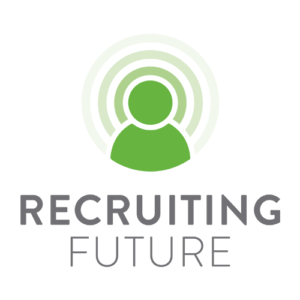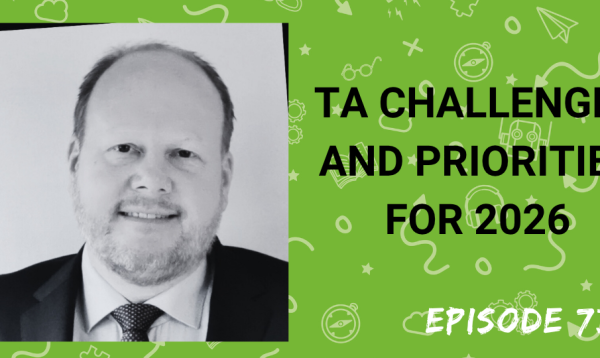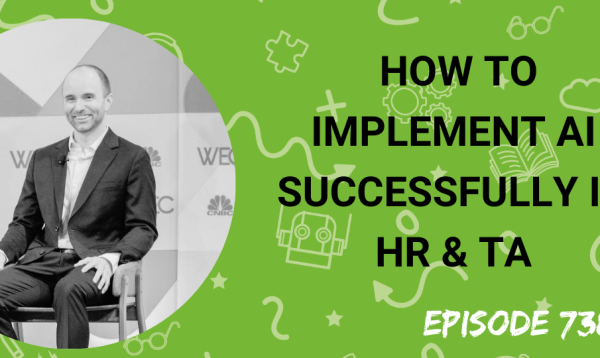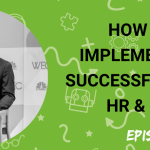Anyone familiar with the world of recruiting technology will know that in the last few years the ATS landscape has changed massively with the growth of a new generation of systems that are very different to their predecessors. It was my pleasure to catch up with several new generation providers at the recent HR Technology Conference in Las Vegas a few weeks ago and see how their offerings have developed.
While I was at the show I recorded an interview with ATS veteran Jerome Ternynck. Jerome is the founder of SmartRecruiters which was one of the first new generation systems to be launched and he has some fascinating insights into how the industry is changing.
In the interview we discuss:
• How recruiting technology is finally catching up with the actual needs of recruiters
• The changing nature of talent acquisition
• The need for a proper marketing mix in talent attraction
• How technology can help to improve the candidate experience
Jerome also shares his thoughts on the future of HR Technology
Subscribe to this podcast in iTunes
Transcript:
Matt Alder [00:00:00]:
Just before we start this week’s show, I’m excited to tell you about series two of Career Life Stories. If you’ve not seen these video interviews before, they tell real stories about people, their lives and their work. Series two hits the Internet in November and features interviews with Jerry Crispin from Career Crossroads, Johnny Campbell from Social Talent, Tony Baish from Stryker, and me. Here’s the trailer.
Trailer [00:00:29]:
When I was younger, I always thought, I want to have a job with a briefcase.
Trailer [00:00:37]:
Distinctly remember saying, I’m never going to work in an office behind a desk. I’m going to work outdoors. Didn’t quite turn out that way.
Trailer [00:00:46]:
I was incredibly shy, like, painfully shy. So obviously I started doing drama.
Trailer [00:00:58]:
So was there an element of rebelling against the authority you’d had?
Trailer [00:01:02]:
Without a doubt.
Trailer [00:01:04]:
Without a doubt.
Trailer [00:01:05]:
What was growing up like.
Trailer [00:01:10]:
My teachers hated me.
Trailer [00:01:11]:
This is hard to admit, but I literally, literally cut classes every day for an entire year.
Trailer [00:01:17]:
And in my very last week of high school, I was involved in a serious car accident. And that really changed the trajectory of my career.
Trailer [00:01:27]:
I loved the fact that it was us against the world. I kind of felt my career had really started at that point.
Trailer [00:01:36]:
Your.
Trailer [00:01:37]:
Your hat.
Trailer [00:01:39]:
My hat.
Trailer [00:01:40]:
Was that intentional?
Trailer [00:01:43]:
I was clueless about what it really would take for me to get another job.
Trailer [00:01:50]:
Within a couple of months, we were facing a crisis. All the money we invested was gone, and we had to figure out a way to survive.
Trailer [00:01:56]:
I honestly, I remember at that time thinking, gosh, like, I, am I even going to make it out of this? And do I even care?
Trailer [00:02:02]:
I softened for the right reasons. And I kind of learned that there’s more to life.
Trailer [00:02:06]:
She was a phenomenal, phenomenal person.
Trailer [00:02:09]:
A lot of the things that have held me back at various points in my life and my career are of my own making.
Trailer [00:02:15]:
Tell me about the time you asked to write your own obituary.
Trailer [00:02:22]:
My life has always got better when I’ve done things that are outside my. Outside my comfort zone.
Trailer [00:02:29]:
You have to take more responsibility for what it is you do and do that really well.
Trailer [00:02:34]:
Defining success is the most important thing to being successful.
Trailer [00:02:39]:
You have to kind of have that courage, have that belief, have that confidence that you can do it.
Trailer [00:02:45]:
You know, once people are gone, they’re gone. Somebody goes, what the hell happened to that guy with the hat?
Matt Alder [00:02:59]:
Career Life Stories is produced by Working Films. To find out more and to sign up for Updates, go to careerlife stories.com that’s careerlife stories.com.
Matt Alder [00:03:29]:
Hi, everyone, this is Matt Alder. Welcome to episode 108 of the Recruiting Future podcast. Anyone familiar with the world of recruiting technology will know that in the last few years, ATSs have changed massively, with the new generation of systems being very different to their predecessors. It was my pleasure to catch up with several providers at the HR Technology conference in Vegas earlier in the month to see how their offerings had developed. While I was at the show, I recorded this interview with ATS industry veteran Jerome Ternynck. Jerome is founder of Smart Recruiters, which is one of the first new generation systems to launch, and he has some fascinating insights into how the industry is changing.
Matt Alder [00:04:18]:
Hi, Jerome, and welcome to the podcast.
Jerome Ternynck [00:04:21]:
Hi, Matt. Thank you for having me on the show. Really good time here.
Matt Alder [00:04:25]:
Absolutely. So I should explain for everyone who’s listening where we are and what we’re doing because of all of the background noise. So we’re HR Tech in Vegas. We’re on the Smart Recruiters stand. It’s a very big show. There’s lots of, lots of things going on. And Jerome, could you just sort of introduce yourself and then we’ll sort of talk about, you know, what’s going on at the show.
Jerome Ternynck [00:04:46]:
Absolutely. So, Jerome Ternynck, I’m the founder and CEO of SmartRecruiters. We’re a talent acquisition suite, kind of the next generation of talent acquisition suite. And I’ve been at it for now about two decades. Did one of the first ATS’s back in 2000, and then moved to San Francisco in 2010 to build a new generation of ATS. So I’m having fun and this show has been great.
Matt Alder [00:05:12]:
Absolutely. Now I actually remember doing a video interview with you in 2010 in San Francisco when smart recruiters was about five people. And obviously it’s a lot bigger than that. It’s a lot bigger than that. Now, what’s sort of changed in those last seven years? I mean, we’re seeing lots of talk about artificial intelligence and machine learning and there’s robots all around everywhere. In this particular show, what do you think changed in recruitment technology and what are the sort of key things that people should be asking and looking for now?
Jerome Ternynck [00:05:45]:
I think what’s really changed is finally the technology is catching up to the actual recruiting needs. When the first round of recruiting technology came out, the applicant tracking systems, Right. As the name says, were designed to track applicants. But actually this has nothing to do with how do you recruit people. If you think about recruiting good people, you need to find them and engage with them. So that speaks to marketing candidate experience. Different channels. Then you need to pick the right one, which speaks to collaboration, hiring manager, having a good process, some assessment. And as a recruiting team, you need to have everything in one platform so you are in control. And today we’re finally witnessing the first set of real technology, real talent acquisition suite that are designed for hiring success, designed fit for purpose. And we’re going away from, oh, my ATS is bad, but there’s nothing I can do about it. Let me put a CRM on top of it. And now I have two different records of candidates. I don’t know who is who. And I’m doing my life in LinkedIn and then Teleo and then I market these guys in another CRM and I have my assessment over here, a video interviewing. And at the end of the week, I have absolutely no idea what has happened. Right. And managers are not using it, so they’re addressing it in email. I maintain spreadsheet. That world is going away. So I think what is really happening in talent acquisition right now is we’re finally getting the technology we need to find, select and hire great talent.
Matt Alder [00:07:23]:
Absolutely. And I suppose one of the things that’s interesting to me is back in the dawn of time when ATS kind of first arrived, obviously they were supposed to improve the recruitment process by using technologies to do that, but they were supposed to improve the candidate experience as well. And from what I’ve seen over the years, that’s not been the case. Where do you think, how do you think technology can improve the candidate experience moving forward? Because it’s such a big issue for so many employers.
Jerome Ternynck [00:07:58]:
I think it starts by one understanding what a candidate is. And I will say you cannot have a good candidate experience if you’re actually managing applications and not candidates. Right. And if you’re managing people in a CRM, applicants in an ats. Right. Just like you cannot have a good customer experience if you don’t have a good single record of who your customers are. And today no TA function has a single record of their candidates. Like, you visited my website and this. Then you applied here, you got rejected, you came back, I emailed you, you were nurtured, you came to an event, now you’re re engaging, you’re in two jobs application at the same time, you’re getting an offer, and I know exactly what has happened to you. This world is not happening. So good candidate experience has not happened. Not by lack of desire from recruiters, but by lack of technology and lack of Capabilities. And so when we designed Smart recruiters, I made really sure, coming out of that ATS world, really sure that we have a single candidate profile that finally provides our customers the ability to deliver an amazing candidate experience which goes beyond, okay, I can apply in one click. It works with my cell phone and all of these good things, which frankly are like table stakes, which not every organization have achieved, obviously, but these are table stakes. But then it goes further into, I know who you are as a candidate and I’m not emailing you a job for which you got rejected last week, which is happening every day.
Matt Alder [00:09:36]:
And how do you think talent acquisitions changing? Because I’m getting the sense from going through some of the sessions here, you know, there’s a much more proactive sense about what talent means to organizations and talent. Talent acquisition is all about competitive advantage and all this kind of stuff. How do you think talent acquisition is changing? What are you seeing from the employers that you’re working with?
Jerome Ternynck [00:10:01]:
There is this misconceived idea in my mind that talent acquisition is an HR workflow. And it’s not, it’s not a linear workflow, it’s not an HR only problem. Talent acquisition is a strategic ability for organization to acquire better talent than their competition, period. Whoever gets the best talent at the end of the day, wins. Especially nowadays in the workforce crisis we are facing in the digitalization we are facing the right companies really compete for talent and they’re getting very good at it. And so I think that what drives the change in talent acquisition is we’re looking more at it as a sales and marketing like function than we are as a linear workflow that would fit in your HR system where applicants are processed from A to B with clicks.
Matt Alder [00:10:54]:
I think that’s interesting because there’s a, there’s, there’s kind of, there seems to be an endless argument at the moment about is, is recruitment marketing and you know, are they the same thing? And you know, I’ve got, you know, I’ve got a kind of view on that. But what is the relationship between recruiting and marketing? Are they, are they very different disciplines? They share, do they share some kind of tools and techniques? What’s, what’s, what’s your view?
Jerome Ternynck [00:11:15]:
I think you’re, we should be talking about a marketing mix in recruiting, just like we’re talking about a marketing mix in normal marketing. And we’ve gone from the job boards advertising, which then became a dirty word like spray and pray. LinkedIn managed to convince us that we all need to go outbound and start Calling cold calling candidates. And the reality is for some candidates, you should rather go outbound for. For some candidates you should rather go inbound. If you’re smart, you’re doing a bit of both. And you also can access referrals and you can nurture town pools. And so I think the real need for recruitment marketing is actually for a proper marketing mix in recruiting that allows you to optimize your resources, your budget to the audience that you’re targeting.
Matt Alder [00:12:10]:
So this is an HR technology show. Lots of, lots of technologies kind of on display from the sort of the tried and tested things that we’ve seen time and time again. So there’s a couple of very big stands by the front door from two of the big job boards, you know, all the way through, sort of cutting edge stuff that I can’t quite get my head around. Where’s the future? What are you seeing that’s interesting? How do you think this is going to sort of develop over the next, in the next few years? I think we’ve seen a lot of technology change certainly in the last sort of three or four years. Where are we going next?
Jerome Ternynck [00:12:45]:
I think where we are going next is we have to enable a proper management of talent acquisition and have a consistent technology stack. If you have an ATS that you hate and that you are not using, then adding AI on top of it is not going to do anything. The reality is, if you want to be successful in hiring, I think you need one, the ability to find great candidates, Mark Tickley Ting mix, two, the ability to work with managers to select the right ones, and three, the ability for recruiters to have everything in one place. So when you assess recruiting technology as opposed to assembling the pieces, look at your ATS and think, okay, is this going to help me find candidates? Are managers going to use it every day with a smile? And will my recruiters be happy and productive with that technology? And unless the answer is yes to those three questions, then you’re not going to be able to move the function forward other than by patching small add ons here and there, which frankly are not going to really move the needle.
Matt Alder [00:13:53]:
Absolutely. I suppose this is a related question, but I was doing a presentation the other day and someone actually asked me, you know, what do I do first? I want to, you know, massively sort of improve how we do talent acquisition. I can see that technology is the way forward, but there’s such a bewildering array of options and opportunities and I’m suffering from sales exhaustion because I’m Just, you know, just being sold to all the time. You know, what’s the one thing I should do first to sort of take me, take me on this sort of recruitment technology journey? What’s your view?
Jerome Ternynck [00:14:26]:
I think it’s exactly like you have a car that’s not running and you’re asking me, should I paint it? No, you should not paint your car. You should change your car. And yes, I get it that it’s easier to do a small AI project or a new website or something nice that’s going to take a few months. And really, do you really want to go after your ats? The truth is, if you want to build a world class talent acquisition function, the technology is available today and it is up to you to go and roll up your leeve, change your ATS and enjoy hiring success. We have taken, I’m not going to say buy smart recruiters. We’re not the only one. We have taken massive, massive organization. I’m talking hundreds of thousands of employees live globally in less than a year. And the world on the other side is very, very, very different.
Matt Alder [00:15:19]:
Absolutely. Thank you very much for talking to me.
Jerome Ternynck [00:15:22]:
Thank you, Matt.
Matt Alder [00:15:24]:
My thanks to Jerome. You can subscribe to this podcast in itunes on Stitcher or download the show app on your smartphone. Just search for recruiting future in your app store. You can listen to all the past episodes@www.rfpodcast.com on that site. You can also subscribe to the mailing list and find out more about working with me. Thanks very much for listening. I’ll be back next week and I hope you’ll join me.









